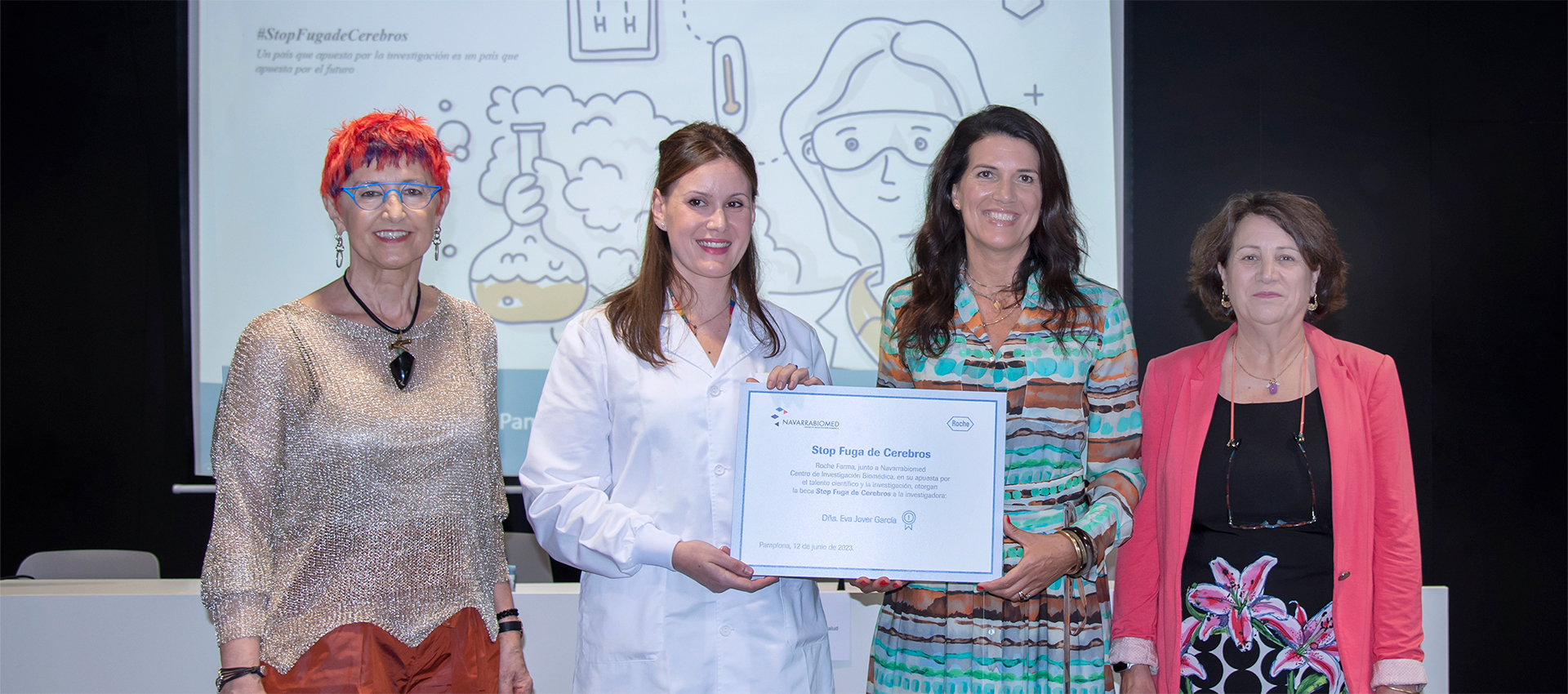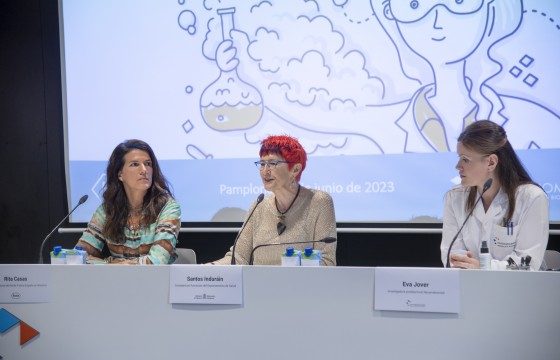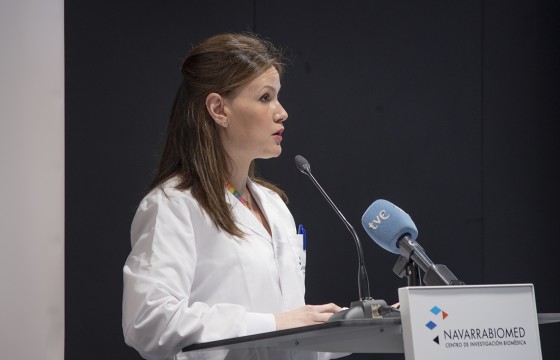
Researcher Eva Jover receives a “Stop the Brain Drain” grant from Roche Farma to continue her research in the cardiovascular field.
- The grant aims to promote talent retention and enhance translational public research carried out by Navarrabiomed and HUN.
Today, Navarrabiomed held the award ceremony for the “Stop the Brain Drain” grant, provided by Roche Farma España, which was awarded to postdoctoral researcher Eva Jover García. The objective of this scholarship is to support the work carried out by the Miguel Servet Foundation and the Department of Health in promoting public biomedical research in Navarra, while fostering the retention of scientific talent. Thanks to this grant, the researcher will continue her studies on valvular disease within the Translational Cardiology Unit, which comprises professionals from Navarrabiomed and the Clinical Cardiology Area of the University Hospital of Navarra.
The award ceremony was presided over by the Regional Minister of Health, Santos Induráin Orduna, along with Rita Casas Carroggio, the Regional Director of Roche Farma España in Navarra. They were also accompanied by María Bezunartea Álvarez, the Managing Director of Navarrabiomed - Miguel Servet Foundation.
After five years of postdoctoral research at the University of Bristol (United Kingdom), in 2020 Eva Jover joined the Translational Cardiology Group at Navarrabiomed, led by Dr. Natalia López-Andrés, upon being awarded a competitive Sara Borrell postdoctoral contract from the Carlos III Health Institute, which recently ended. She will now benefit from the “Stop the Brain Drain” grant, which initially lasts for one year and can be extended for an additional year, providing an annual gross funding of €60,000.
“This contract, which is funded through the “Stop the Brain Drain” grant from Roche Farma, offers me the opportunity to continue my research in Spain and strengthen my future prospects as a researcher at Navarrabiomed. In an R&D&i environment that is sometimes limited and uncertain, initiatives like this facilitate the establishment of a healthier research environment and promote technological and intellectual transfer,” noted Dr. Jover.
Investigating Valvular Disease
Cardiovascular diseases are the leading cause of death in industrialized countries. Valvular disease represents the third most common form of cardiovascular disease, and it is expected to increase due to population aging. There are currently no drugs available to treat it, and in severe cases, heart surgery is the only therapeutic solution, albeit with high socio-economic costs.
Thanks to research efforts like those carried out by Navarrabiomed, we now have a better understanding of the pathophysiological characteristics of valvular disease. National and international collaborations, multidisciplinary research teams, the selfless participation of patients, and a strong and stable research framework are essential for translating research into improvements in current diagnostic and therapeutic tools.
This grant will allow for further studies on aortic valve disease and the identification of new treatments. Factors such as sex, renal disease, or even oncological treatments significantly worsen the progression and prognosis of patients with valvular disease. A better understanding of how these factors contribute to the development and progression of aortic valve disease will both improve clinical management and patient survival and help identify new therapeutic targets. Ultimately, the goal is to offer personalized medicine in the field of cardiology.
The Regional Minister of Health, Santos Induráin, has emphasized the support that initiatives like “Stop the Brain Drain” provide for talent retention in the region, complementing the Department of Health’s significant investment in research promotion. “This strengthening of public biomedical research,” she stated, “will lead to a robust, stable, and high-quality healthcare system that works at the forefront of knowledge. In this regard, the coordinated work of HUN, Navarrabiomed, and UPNA, entities that coexist in the same biosanitary campus, is considered crucial by the Government of Navarra.”
Rita Casas from Roche Farma España highlighted the importance of Dr. Eva Jover’s work in valvular disease and her colleagues in the Translational Cardiology Unit during the event. “For Roche, it is a priority to promote and support scientific talent in the biomedical field; only by doing so can we truly advance in the development of new diagnostic tools and innovative therapies that allow us to address the main health problems faced by patients.”
Second edition of the grants
The “Stop the Brain Drain” program is part of a project by Roche Farma that began in 2017 with the aim of retaining the best researchers and promoting the development of their work in the local area, thus creating a network that, through scientific work, ultimately has a positive impact on patients and society. In the case of Navarra, this is the second time that Roche Farma has awarded one of these scholarships, as they previously funded the research of Carlos Hernández Sáez at Navarrabiomed in 2019.




